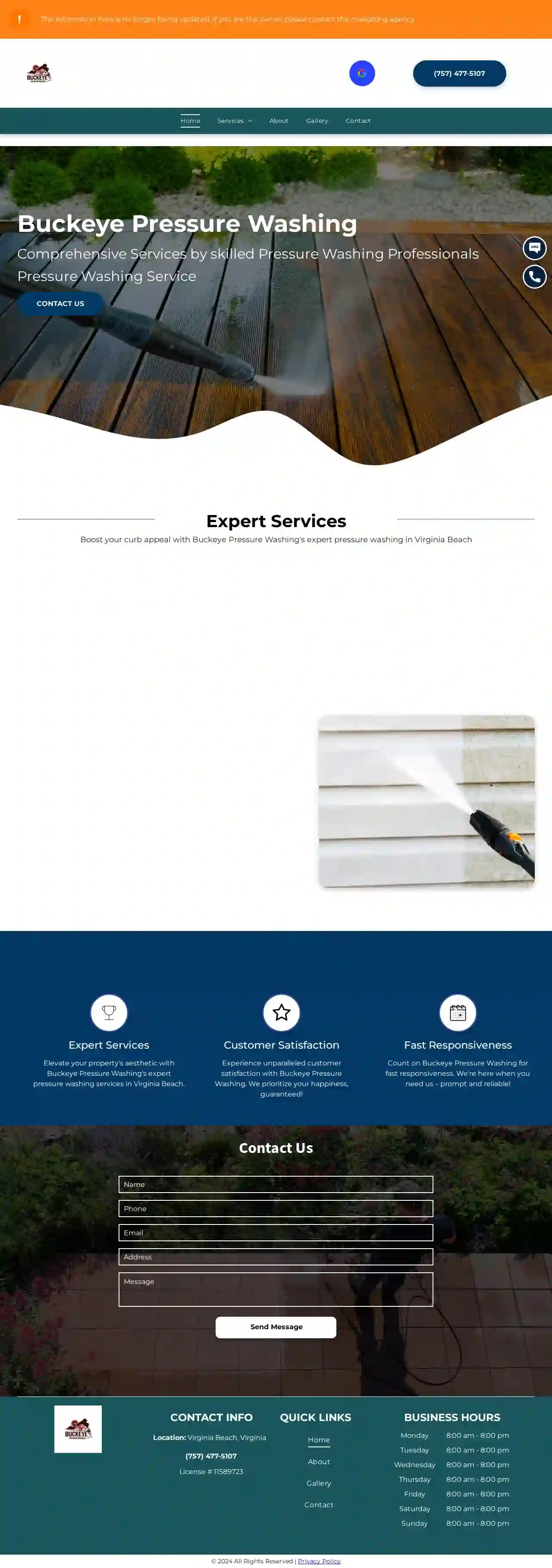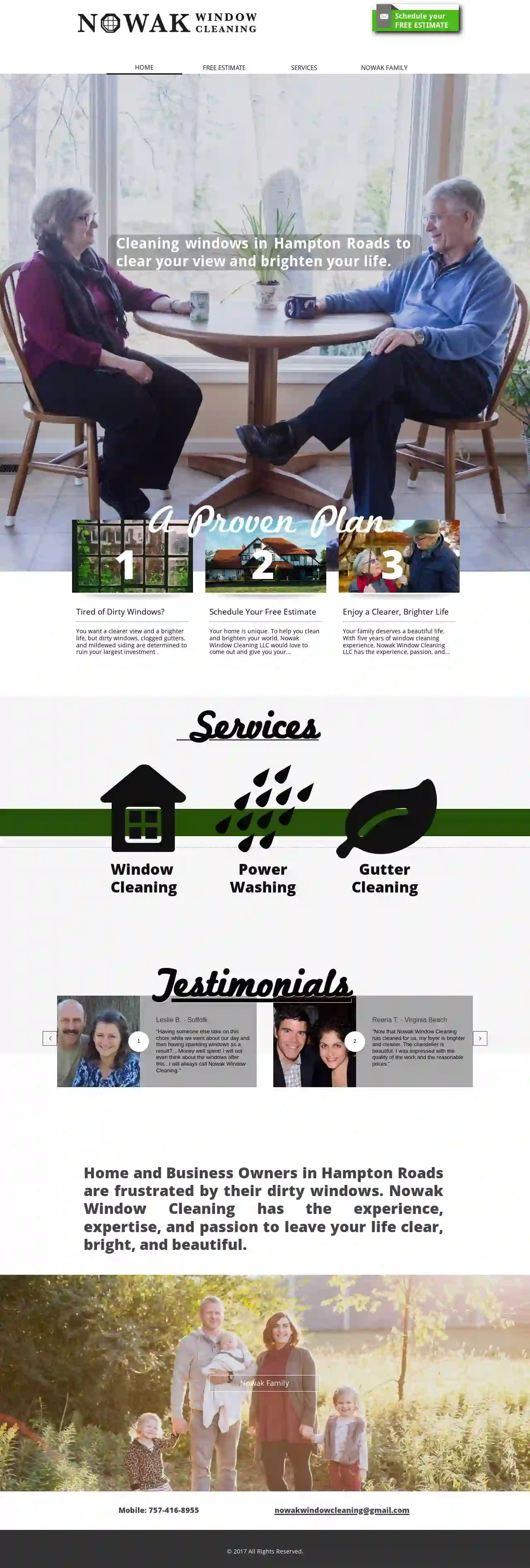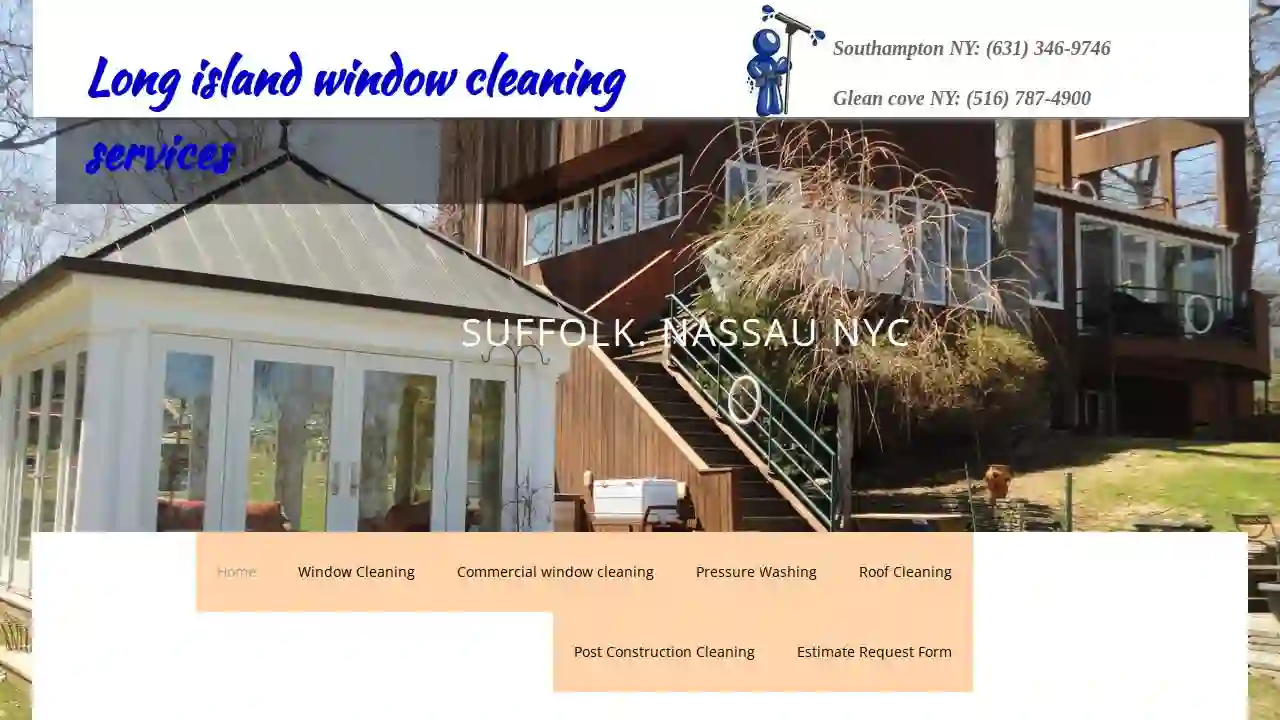Window Cleaning Madison Heights
Find the best Window Washing in Madison Heights
Get 3 FREE Window Washing quotes for your project today! Compare profiles, reviews, accreditations, portfolio, etc... and choose the best deal.

Crystal Clear Window Cleaning
4.7151 reviewsSuffolk, USCrystal Clear Window Cleaning is proud to be one of the largest window cleaning companies in the United States. We have operated a simple, honest, family owned business for over 25 years, thanks to our wonderful staff and amazing clientele. Not only do we pride ourselves in delivering a great customer experience, but we value professionalism and integrity in all aspects of our work. I personally guarantee that you'll see the Crystal Clear difference.
- Services
- Why Us?
- Accreditations
- Our Team
- Testimonials
- Gallery
Get Quote
Buckeye Pressure Washing
Virginia Beach, USAt Buckeye Pressure Washing in Virginia Beach, VA, we know the value of a clean, inviting exterior. Our family-owned and veteran-led team brings five years of dedicated pressure washing experience to residential and commercial clients throughout the Virginia Beach area. We're committed to revitalizing your property with care and professionalism.
- Services
- Why Us?
- Accreditations
- Gallery
Get Quote
Exterior Cleaning Solutions
51 reviewsSuffolk, USExterior Cleaning Solutions is a property owner’s best friend. You shouldn't trust your property’s appearance to just anyone. Whether you own a home or operate a business, you know that keeping the exterior of your property clean will boost your property value, create that first impression you need if you’re showing your house or trying to attract customers, and extend the life of your building. Exterior cleaning is no amateur do-it-yourself project. You need professionals who can restore the components of your home or business to their best condition. You need Exterior Cleaning Solutions. We use power washing and soft washing techniques on all types of siding or exterior surfaces. From vinyl to wood, to fiber cement siding to stucco, we’ll get rid of the contaminants that can accumulate on the exterior of your home. The same holds true for our roof cleaning surface. Exterior Cleaning Solutions will reach the hard to reach places on your roof whether it’s made of asphalt, cedar, or slate. And Exterior Cleaning Solutions is certified by the Roof Cleaning Institute of America (RCIA). We will clean your windows in both the interior and exterior of your home as well. We’re not just all about exteriors either. We will clean your sidewalk paths, driveways as well as your pavers to make the entrance to your home look spectacular. Exterior Cleaning Solutions also provides cleaning services for all types of fences. We’ll even clean and restore your gutters to make sure that ice dams won’t form and rainwater won’t damage your home. Exterior Cleaning Solutions will also clean playground equipment. If you run a commercial establishment, Exterior Cleaning Solutions offers many of the same services including exterior washing of your building, windows, and sidewalk cleaning. We also provide services that are specific to businesses such as gum removal. We’ll put in the work to take care of difficult to clean areas. If you have a dumpster pad or if you run a restaurant or other business that has a drive-thru pad, we’ll scrub it down and get rid of contaminants. If you run a gas station or repair shop, we know it’s difficult to clean the grounds, the exterior surfaces, and the islands on your property. Exterior Cleaning Solutions will also take care of specialty cleaning jobs like cleaning efflorescence and calcium deposits. We’re also the experts at rust removal, dryer vent cleaning, shrink-wrapping, and gutter restoration. Regular cleaning and maintenance will enhance your property’s curb appeal and improve the durability of things like your sidewalks and your exterior surfaces. If you want your business to have a professional look or if you want your home to retain its beauty, you need to hire the experts at Exterior Cleaning Solutions. We’ll make everything look shiny and new, and we’ll always do the job professionally.
- Services
- Why Us?
- Accreditations
- Gallery
Get Quote
Nowak Window Cleaning
514 reviews123 Main Street, Chicago, 60659, USNowak Window Cleaning is a family owned and operated business serving the greater Chicago area. We are fully insured and bonded, and we take pride in providing our customers with the highest quality window cleaning services at competitive prices. We offer a variety of services, including residential and commercial window cleaning, gutter cleaning, pressure washing, and more. Our team of experienced and professional cleaners is dedicated to providing our customers with exceptional service and results. We are committed to exceeding your expectations and making your windows sparkle! We are a family owned and operated business serving the greater Chicago area. We are fully insured and bonded, and we take pride in providing our customers with the highest quality window cleaning services at competitive prices. We offer a variety of services, including residential and commercial window cleaning, gutter cleaning, pressure washing, and more. Our team of experienced and professional cleaners is dedicated to providing our customers with exceptional service and results. We are committed to exceeding your expectations and making your windows sparkle!
- Services
- Why Us?
Get Quote
SHINE Window & Home Exterior Cleaning Services
4.886 reviewsSuite F, 3835 Holland Blvd., Chesapeake, 23323, USCelebrating 24 years in business! LICENSED • INSURED • BACKGROUND CHECKED • UNIFORMED. We take what we do seriously. And we think you should be able to trust the people cleaning your home to do it right…every time. With one simple phone call, you can have your entire home–windows, siding, roof, gutters, and more– free of green slime, dead bugs, rust stains, dirt, and grime. Restore the original luster and “show-quality” beauty to your home easily with our exclusive and innovative cleaning process. We are fully licensed, bonded, and insured with $5 million in liability and workman’s compensation coverage so you and your home are protected. Uniformed, courteous, and professional cleaning technicians that work diligently and leave only a glistening home behind. We run third-party criminal background checks on all employees. Some of our technicians even hold FBI and government security clearances! All done so you feel safe. We’ll give you the most thorough cleaning ever or it’s FREE. We back every service that we do for you with our ironclad, no-hassles, no regrets “Sensational Cleaning,” 100% money back guarantee.
- Services
- Why Us?
- Testimonials
- Gallery
Get Quote
Power Professional Cleaning Corporation
110-15 72nd Ave, Suite 201, Forest Hills, 11379, USP&C Cleaning Corporation is a family-owned and operated business serving the greater New York City area. We are a full-service cleaning company specializing in commercial and residential cleaning. Our mission is to provide our clients with the highest quality cleaning services at competitive prices. We are committed to using environmentally friendly cleaning products and practices. Our team of experienced and professional cleaners is dedicated to providing our clients with a clean and healthy environment. We offer a wide range of cleaning services, including: Office Cleaning Retail Cleaning Industrial Cleaning Residential Cleaning Post-Construction Cleaning Window Cleaning Carpet Cleaning Floor Stripping and Waxing Janitorial Services We are fully insured and bonded, and we are committed to providing our clients with the best possible service. Contact us today for a free quote.
- Services
- Why Us?
Get Quote
Village Window Cleaning
525 reviewsSuffolk, USLet Us Do The Dirty Work Quality Window Cleaning& Power Washing on Long Island Long Island Village Window Cleaning & Power Washing serves commercial and residential properties to save you time, money, energy and stress. Basically, our mission is to do the stressful and time-consuming work to upgrade your space, all so you don't have to. And we do everything with extraordinary attention to detail and superior craftsmanship, with a team of experienced, licensed, insured and dedicated professionals. Specializing in Both Commercial & Residential Properties Window Cleaning Whether it's your home or office, our team can transform your windows with brilliant, sparkling results at fair and affordable rates. Power Washing With a proven combination of powerful equipment and cleaning solutions, we're dedicated to providing your outdoor space with the look and feel of a true, brilliant clean. Gutter Cleaning Our gutter cleaning services will save you time, money and stress. We'll spare you from the hazards of cleaning your own gutters while delivering incomparable results. Wide Range of Services Roof Cleaning/Soft Washing • House Washing • Hard Water Stain Removal • Mirrors/Skylights • Glass Restoration • Stucco Cleaning • Screen Repair • Gum Removal • Graffiti Removal • Shower Doors Power Washing of All Exterior Surfaces
- Services
- Why Us?
- Gallery
Get Quote
Fish Window Cleaning
4.812 reviews5541 Parliament Dr #104, Virginia Beach, 23462, USWelcome to Fish Window Cleaning of Virginia Beach, VA! We are your local window cleaning and awning cleaning company servicing Virginia Beach, Chesapeake, Tidewater, Norfolk, Suffolk, and Franklin, Virginia. We provide these services to commercial and residential customers: Window Cleaning, Awning Cleaning, Soft Washing, Pressure Washing, Construction Clean Up, Gutter Cleaning. We were happy to clean the homes of four amazing women affected by breast cancer for free in honor of Breast Cancer Awareness Month. We are participants of FISH Feeds, a charitable project to feed the hungry within our own community. We also provide cleaning of all types of windows and awnings, even the hard to reach ones of your home. We work quietly and quickly as we move from room to room to cause the least disruption. We even introduce our team to you before we start cleaning so you know exactly who will be giving your windows and awnings a spectacular shine.
- Services
- Why Us?
- Our Team
- Testimonials
- Gallery
Get Quote
Shine of Long Island
4.25 reviewsSuffolk, USShine Window Cleaning is a company dedicated to providing high-quality window cleaning and other exterior maintenance services for both residential and commercial clients. They emphasize customer satisfaction, offering a free, no-obligation estimate and a 100% satisfaction guarantee. Shine Window Cleaning goes beyond just window washing, offering a wide range of services including pressure washing, roof washing, gutter cleaning, solar panel cleaning, landscape lighting, holiday lighting, and more. They pride themselves on their professional and friendly team, who are committed to delivering exceptional service and exceeding customer expectations. Shine Window Cleaning also emphasizes their commitment to giving back to the community through their servant-leadership initiatives.
- Services
- Why Us?
- Gallery
Get Quote
Long Island window cleaning services
58 reviewsRoute 454, Hauppauge, 11788, USLong Island Window Cleaning Services is a professional window cleaning company serving Long Island, NY. We offer a range of services including window cleaning, high rise window cleaning, pressure washing, roof cleaning, and post construction cleaning. Our team of experienced professionals uses state-of-the-art equipment and eco-friendly cleaning solutions to ensure a spotless and streak-free finish. With over 20 years of experience, we have built a reputation for providing exceptional service and customer satisfaction. Contact us today to schedule your appointment and experience the difference for yourself.
- Services
- Why Us?
- Gallery
Get Quote
Over 60,241+ Cleaning Businesses onboarded
Our cleaning pros operate in Madison Heights & surroundings!
CleaningMatch has curated and vetted Top Janitorial Services near Madison Heights. Find a reliable business today.
Frequently Asked Questions About Window Cleaning
- Experience: 'How long have you been in the window cleaning business?'
- Licensing and Insurance: 'Are you licensed, insured, and bonded?'
- Cleaning Methods: 'What cleaning methods and solutions do you use? Do you use traditional methods or a water-fed pole system?'
- Safety Procedures: 'What safety precautions do you take, especially for high-rise window cleaning?'
- Guarantees: 'Do you offer a satisfaction guarantee?'
- References: 'Can you provide references from previous clients?'
- Vinegar Solution: Mix equal parts white vinegar and water in a spray bottle. Apply to the stains, let it sit for a few minutes, then scrub with a non-abrasive sponge and rinse. Vinegar's acidity helps dissolve mineral deposits.
- Baking Soda Paste: Make a paste of baking soda and water, apply to the stains, let it dry, then scrub and rinse. Baking soda acts as a gentle abrasive to remove stains.
- Commercial Hard Water Stain Remover: Use a commercial hard water stain remover according to the product instructions. These products are often formulated with stronger cleaning agents to tackle tough stains.
- Professional Window Cleaning: For severe hard water stains or if you prefer to avoid DIY methods, hire a professional window cleaning service. They have specialized tools and solutions for removing stubborn stains.
- Increased Natural Light: Clean windows allow more natural light to enter, reducing the need for artificial lighting during the day, saving energy.
- Reduced Solar Heat Gain: Dirty windows can absorb more heat from the sun, increasing cooling costs in the summer. Clean windows reflect more sunlight, reducing solar heat gain and keeping your space cooler.
- Better Insulation: While windows themselves are not great insulators, clean windows allow for better performance of window treatments (e.g., blinds, curtains), which can help regulate temperature and reduce energy loss.
- Regular Cleaning: Cleaning windows more frequently helps prevent dirt and grime from building up and becoming harder to remove.
- Window Treatments: Using blinds or curtains can help reduce direct sunlight exposure, which can fade furniture and attract dust to windows.
- Landscaping: Trim trees and shrubs near windows to minimize pollen, sap, and bird droppings from accumulating on the glass.
- Air Filtration: Using air filters in your home or business can help reduce airborne dust and pollutants that can settle on windows.
- Protective Coatings: Some professional window cleaners offer protective coatings that can help repel water and dirt, keeping windows cleaner for longer.
What should I ask a window cleaner before hiring them?
By asking these questions, you can assess their professionalism, experience, and commitment to safety and customer satisfaction.
How do I remove hard water stains from my windows?
Always test any cleaning solution on a small, inconspicuous area of the window first to ensure it doesn't damage the glass.
Can window cleaning improve energy efficiency?
By maximizing natural light, reducing solar heat gain, and improving the performance of window treatments, clean windows can contribute to a more energy-efficient and comfortable indoor environment.
How can I prevent my windows from getting dirty so quickly?
By taking these preventive measures, you can prolong the time between window cleanings and keep your windows looking their best.
What should I ask a window cleaner before hiring them?
- Experience: 'How long have you been in the window cleaning business?'
- Licensing and Insurance: 'Are you licensed, insured, and bonded?'
- Cleaning Methods: 'What cleaning methods and solutions do you use? Do you use traditional methods or a water-fed pole system?'
- Safety Procedures: 'What safety precautions do you take, especially for high-rise window cleaning?'
- Guarantees: 'Do you offer a satisfaction guarantee?'
- References: 'Can you provide references from previous clients?'
By asking these questions, you can assess their professionalism, experience, and commitment to safety and customer satisfaction.
How do I remove hard water stains from my windows?
- Vinegar Solution: Mix equal parts white vinegar and water in a spray bottle. Apply to the stains, let it sit for a few minutes, then scrub with a non-abrasive sponge and rinse. Vinegar's acidity helps dissolve mineral deposits.
- Baking Soda Paste: Make a paste of baking soda and water, apply to the stains, let it dry, then scrub and rinse. Baking soda acts as a gentle abrasive to remove stains.
- Commercial Hard Water Stain Remover: Use a commercial hard water stain remover according to the product instructions. These products are often formulated with stronger cleaning agents to tackle tough stains.
- Professional Window Cleaning: For severe hard water stains or if you prefer to avoid DIY methods, hire a professional window cleaning service. They have specialized tools and solutions for removing stubborn stains.
Always test any cleaning solution on a small, inconspicuous area of the window first to ensure it doesn't damage the glass.
Can window cleaning improve energy efficiency?
- Increased Natural Light: Clean windows allow more natural light to enter, reducing the need for artificial lighting during the day, saving energy.
- Reduced Solar Heat Gain: Dirty windows can absorb more heat from the sun, increasing cooling costs in the summer. Clean windows reflect more sunlight, reducing solar heat gain and keeping your space cooler.
- Better Insulation: While windows themselves are not great insulators, clean windows allow for better performance of window treatments (e.g., blinds, curtains), which can help regulate temperature and reduce energy loss.
By maximizing natural light, reducing solar heat gain, and improving the performance of window treatments, clean windows can contribute to a more energy-efficient and comfortable indoor environment.
How can I prevent my windows from getting dirty so quickly?
- Regular Cleaning: Cleaning windows more frequently helps prevent dirt and grime from building up and becoming harder to remove.
- Window Treatments: Using blinds or curtains can help reduce direct sunlight exposure, which can fade furniture and attract dust to windows.
- Landscaping: Trim trees and shrubs near windows to minimize pollen, sap, and bird droppings from accumulating on the glass.
- Air Filtration: Using air filters in your home or business can help reduce airborne dust and pollutants that can settle on windows.
- Protective Coatings: Some professional window cleaners offer protective coatings that can help repel water and dirt, keeping windows cleaner for longer.
By taking these preventive measures, you can prolong the time between window cleanings and keep your windows looking their best.